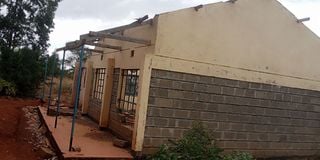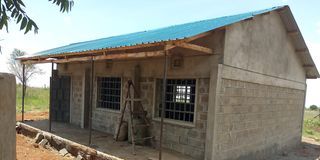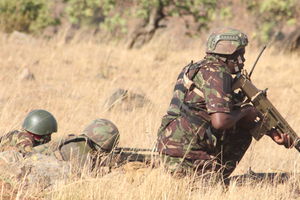
A demolished class room at the desolate Ng'elecha Primary School in Baringo South.
In 2011, hundreds of armed criminals invaded the insecurity prone Ng’elecha in Baringo County and other adjacent villages and made away with thousands of livestock.
During the raid, Stephen Chelelgo, 68, a village elder lost his entire livelihood — hundreds of cows and goats — forcing him and his neighbours to flee the village for fear of more attacks.
During the raid, several people were killed, including a minor in Tandar village. Several homes were torched and schools vandalised.
For Mr Chelelgo, this was not the first raid. He had fled before and returned after calm was restored. But in 2011, the attacks were so fierce that they vowed not to go back anymore.
The villages remain deserted more than a decade later, with what were houses and social amenities now dominated by a thick forest that has now become a hideout for the armed criminals.
Some of the villages neighbouring Ng’elecha that also remain deserted are Kamaech, Sokonin, Soke, Leketet, Chesirim and Koitilil.
According to a village elder, all the villages in the entire Ng’elecha sub-location have been deserted.
“Even what used to be roads cannot be seen anymore because it is overgrown with shrubs. Accessing the area is a death wish. The criminals are still moving to the villages inhabited by the displaced people to push them further away. An entire ward with three locations is almost turning into their exclusive territory,” said Mr Chelelgo.

A classroom that was built at the desolate Ng'elecha Primary School in Baringo South.
“No one has ever gone back to their homes in the more than 12 deserted villages since we left in 2011. As we speak, Ng’elecha Primary School has not been re-opened since its closure 13 years ago. The state had promised to set up a General Service Unit camp in the locality before resettling the locals. We appeal to the state to honour the promise,” he added.
Kibii Toroitich, the Ng’elecha Primary chairperson, said the attacks started in neighbouring villages like Loromoru in 2008. By 2010, he said, 30 per cent of the population in the area had fled the incessant attacks.
“In November 2011, a raid was staged in Ng’elecha and other neighbouring villages where more than 300 criminals descended and stole more than 10,000 livestock in a single raid that lasted for four hours,” said Mr Toroitich.
“Ng’elecha Primary school was closed ... The 2012, 2013 and 2014 candidates were forced to sit their exams at the neighbouring Kimoriot Primary School. Thereafter, the school did not register candidates,” he added.
In 2014, the bandits pitched camp at the school, turning some of the classes into houses and cowsheds.
“We had eight semi-permanent structures that served as classes, an ECDE centre and the administration block. When the locals fled, the criminals and their families occupied the classes,” Mr Toroitich said.
In 2016, the criminals vandalized all the structures in the school, burnt books and documents before carting away iron sheets and solar panels.
A year later 2017, Mr Toroitich said, the school was de-registered without consultation.
“We followed up the matter with the ministry and we were told that for it to be registered again, the school must have structures. Through the assistance of area MP Charles Kamuren, we set up a Sh1.5 million class in 2019 but unfortunately after completion of the project, it was destroyed by security officers who were flushing out criminals,” said Mr Toroitich.
“We yearn to go back to our homes and rebuild our school because all the villagers are now internally displaced and are squatting in different areas. Some of our children also dropped out of school. The State had promised to rebuild all schools vandalised by criminals but Ng’elecha was left out,” he added.
He appealed to the government to open up roads in the area and set up security camps to keep off the criminals.
Paul Chepsoi, a resident, said: “It is sad that the government de-registered the institution without bothering to know where it’s learners went.
Many children at the time dropped out of school after its closure.” He told the Nation that following the attacks, the more than eight teachers at the institution were also transferred.
“The government has not shown any commitment to resettle the displaced locals whose lives have completely been disrupted for more than 13 years,” he said.
In Mukutani, which is inhabited by the minority Ilchamus and Pokot communities, more than 15 villages have been deserted since 2005 due to the attacks.
Some of the abandoned villages have been taken over by the neighbouring community and renamed. For instance, Rine has been renamed Plesian, Lendorok to Ponpon, Ilmeut to Chepkenti, Kabukoki to Matunda and Lontiani to Murkutwo.











